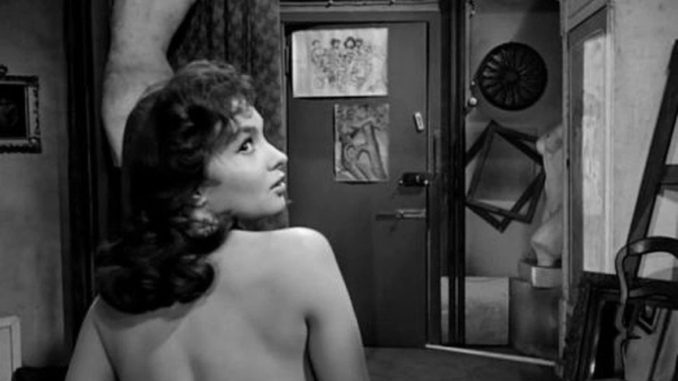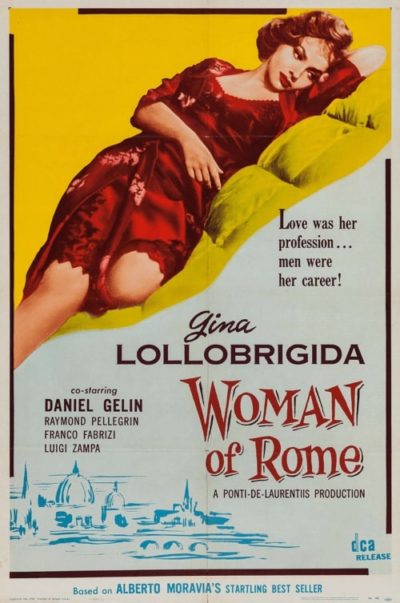
Rating: C+
Dir: Luigi Zampa
Star: Gina Lollobrigida, Daniel Gélin, Franco Fabrizi, Raymond Pellegrin
a.k.a. La romana
Following the recent death of Lollobrigida, I realized I’d never seen any of her films. Well, I did once I figured out she wasn’t Sophia Loren. /pauses to check if Loren is dead. Nope, we’re good. I decided to rectify this with a carefully curated selection of Lollobrigida’s movies. In other words, whatever happened to be available on YouTube. This was the first to show up, and if there’s a lesson to be learned from Woman of Rome, I’d say it’s the quality of star power. The actress, even at this relatively early point in her career (although after her ill-fated dalliance with Howard Hughes), simply holds your attention, simply by her presence. The rest of the film? Welllllllll….
It takes place in pre-war Italy, where Adriana (Lollobrigida) lives with her mother, who ekes out a living doing sewing. Mom – who seems to have a bit of A Past, shall we say – wants to put Adriana out there and exploit her beauty, first as an artist’s model (top), and then marrying her off. The intended husband is Astarita (Pellegrin), a boring but reliable bureaucrat in the fascist government. Adriana, of course, is having none of it, and wants to find her own way in life. This consists mostly of her hooking up with a buffet of less than ideal partners. Examples include driver Gino (Fabrizi), who turns out to have a wife and children already, or Mino (Gélin), a student and anti-goverment activist. Hell, one particularly ill-advised choice turns out to be a murderer.
 Even those who are less than homicidal don’t really come out of this with much credit. Gino frames a colleague for theft. Mino betrays his activist friends at the drop of a Fascist hat. Adriana, meanwhile, seems to have prostitution as her main source of income, and steals a powder-box from Gino’s employer. She also has a fiery temper, which takes little to trigger. However, she does have a moral system, and goes to confession like a good Catholic girl. She is, certainly, more complex than the men, who are almost interchangeable. Astarita might be closest to a rounded character. Devoted to Adriana, and in it for the long haul, his Fascism is very low-key (though as depicted here, the political climate seems of no concern to most people). He’s just… dull.
Even those who are less than homicidal don’t really come out of this with much credit. Gino frames a colleague for theft. Mino betrays his activist friends at the drop of a Fascist hat. Adriana, meanwhile, seems to have prostitution as her main source of income, and steals a powder-box from Gino’s employer. She also has a fiery temper, which takes little to trigger. However, she does have a moral system, and goes to confession like a good Catholic girl. She is, certainly, more complex than the men, who are almost interchangeable. Astarita might be closest to a rounded character. Devoted to Adriana, and in it for the long haul, his Fascism is very low-key (though as depicted here, the political climate seems of no concern to most people). He’s just… dull.
It’s clear why every single man falls for Adriana, and if she’s your typical Italian streetwalker, I’m very impressed. Yet the further in this goes, the harder it is to care about her, or anyone else. In that light, it feels like a predecessor to Smithereens: unlikable people making poor decisions isn’t typically going to engage my sympathy. It similarly shares a sense of being a love letter to its location, in this case Rome. Watching Adriana stagger home through the deserted city streets at dawn, and the way Zampa captures it, almost makes up for the relentlessly depressing tone.
